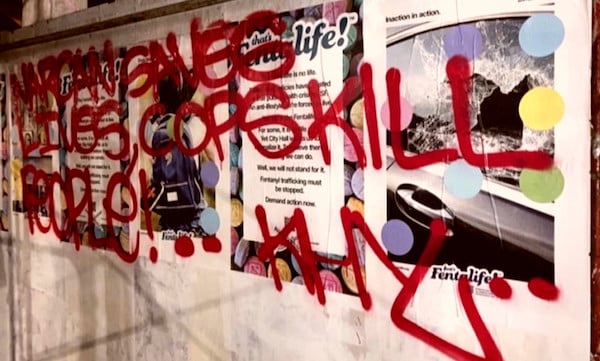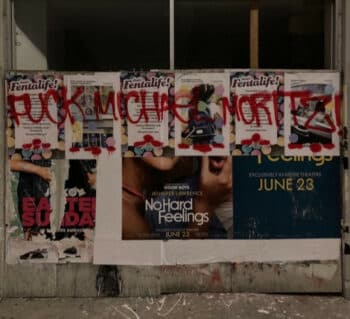A “street art” campaign backed by Welsh tech billionaire and venture capitalist Michael Moritz is being targeted by graffiti artists in San Francisco, California. The campaign features posters and even wheat-pastes which call for a “law and order” approach to homelessness and fentanyl related deaths in San Francisco.
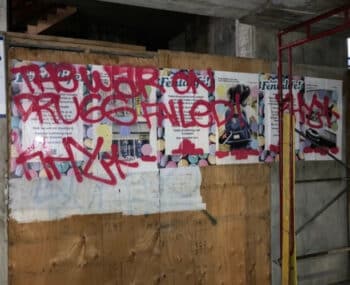
Graffiti of billionaire backed “street art” reads, “The War on Drugs Failed!” (Source: Indybay.org)
Moritz, in an effort to further social cleanse the poor from urban core areas, along with many on the Right, have rushed to blame “the Left” for rising homelessness, crime rates and drug use in San Francisco. In February, the New York Times published an editorial by Moritz entitled, Even Democrats Like Me Are Fed Up With San Francisco, which echoed far-Right talking points demonizing those most displaced and excluded from the capitalist system.
As Tim Redmond of 48 Hills wrote:
The only “tyranny of the minority” that’s happened in San Francisco in the past 40 years is the dominance of a few big business leaders and plutocrats who have funded campaigns that have kept their allies in the Mayor’s Office.
But local graffiti artists in San Francisco hit back on the billionaire backed “street art” campaign. According to a post on Indybay.org:
Graffiti reads, “Fuck Michael Moritz!” (Source: Indybay.org)
Under the cover of night, with the Frisco fog as our accomplice, a crew of friends vandalized over 10 of the right-wing, pro-police “Fentalyfe” street poster installations.
We painted messages such as “Narcan Saves Lives, Cops Kill People,” “The War On Drugs Failed,” “TogetherSF = SFPD,” “Cops Sell Fentanyl,” “Fuck You Fascists,” and “Fuck Michael Moritz.”
These disturbing posters are part of a $300k campaign, by reactionary group Together SF (who are funded by billionaire venture capitalist Michael Moritz), that is shaming drug and Narcan users, and calling for the racist criminalization of poor people. They are also calling for the criminalization of graffiti while themselves wheat pasting posters on the streets.
These fascists will never win the terrains of street art or graffiti; they will never have the streets. We call on all creative vandals to resist the fascist creep into our visual landscape.
Against police, prisons, politicians, billionaire capitalists, and their society.
For care, love, and solidarity.
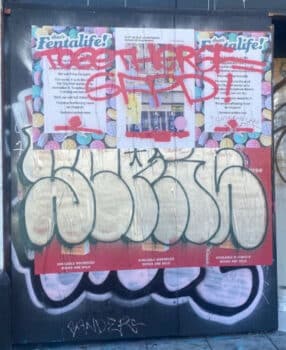
Graffiti reads, “TogetherSF = SFPD!” TogetherSF is a publication owned by tech billionaire Michael Moritz.
The recent “street art” campaign backed by Moritz comes as anger is boiling over against the recent killing of Banko Brown, a 24 year-old Black transgender man who was shot and killed by a security guard at a Walgreens on April 27th. The district attorney of San Francisco decided that the city would not seek charges against the security guard, who shot and killed Brown after accusing him of shoplifting and physically attacking him inside the store.
This decision by the district attorney to not prosecute Brown’s murderer comes hot on the heels of attempts by the city’s Mayor, London Breed, to re-ignite drug-war era policies and increase sweeps of houseless encampments. Just as with the brutal murder of Jordan Neely on a New York City subway, Brown’s murder and the state’s subsequent passive support sends the message that vigilante violence against the houseless and poor, especially people of color and queer and trans folks, is not only encouraged, but sanctioned.
Center to promoting this narrative have been corporations like Walgreens, who have waged a propaganda campaign falsely claiming increased shoplifting has led to the closure of multiple stores across the city. In reality, in the post-pandemic world, not only are people more strapped for cash and less apt to spend money on goods, but those with extra money to spend are more likely to buy online and are also increasingly working from home remotely; leading to a decrease in foot traffic in major cities. As Axios reported:
San Francisco’s sluggish recovery is due at least in part to its heavy concentration of tech workers–many of whom decamped elsewhere amid the pandemic–as well as a shortage of affordable housing.
In fact, recent investigations have shown that stores like Walgreens overinflated claims of “crime.” According to The Guardian:
A major U.S. drugstore chain that supposedly experienced a surge in shoplifting last year—fanning the flames of conservative outrage over a purported spike in crime and disorder—said on Thursday that it might have overstated the problem.
“Maybe we cried too much last year when we were hitting numbers that were 3.5% of sales,” Kehoe said, according to an earnings call transcript. “We’re down in the lower twos, call it, the mid-2.5, 2.6 kind of range now.”
While shoplifting might not have hurt Walgreens’ bottom line as much as it once thought, the company said it suffered a $3.7bn loss in its first quarter, partly relating to litigation over the U.S. opioid epidemic, which has killed hundreds of thousands of Americans in the last decade. Walgreens reached an opioid-related settlement with state and local governments last quarter to pay $5.7bn over 15 years.
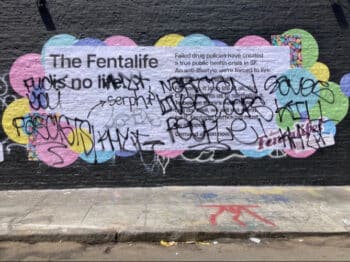
Graffiti reads, “Narcan Saves Lives, Cops Kill People!” “Fuck Your Fascists!” Source: Indybay.org
Regardless of the facts, this anti-poor and anti-houseless hysteria has reached epic heights. On April 4th of this year, Bob Lee, the founder of CashApp, was stabbed to death and many quickly rushed to blame a houseless person. In reality, Lee’s killer was a “tech executive in San Francisco [who] also worked in the tech industry.” Meanwhile, across the country, acts of violence against the houseless are increasing, including in San Francisco. As Forbes reported:
Former San Francisco fire commissioner Don Carmignani is facing accusations he was behind a series of attacks on homeless people, after a lawyer for a man accused of beating him reportedly said in court Wednesday she’d uncovered evidence suggesting that Carmignani might have attacked homeless people with bear spray.
Rising rents, flattening wages, and cuts to social services—policies backed by the billionaire class of both parties have led to the current crisis in San Francisco, a situation which has only worsened since the pandemic. These are the same factors pushing out working and middle-class workers from urban cores, which in turn are causing the closure of many retail stores, like Walgreens. Increased police repression and “law and order” policies won’t address any of these problems, which in turn are feeding the growing mental health and drug overdose crises.
Capitalism offers no solutions—only more police in an attempt to keep everything from falling apart. What is needed are movements, struggles, and actions from below which meet our needs directly, outside and against the interests of the rich who control and benefit from this disaster.

